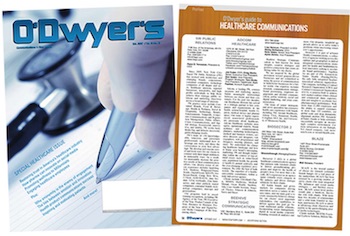|
|
As with all new and shiny toys, marketers can’t get enough of artificial intelligence and virtual reality. But just as fast as Snapchat announces a new filter, our ability to successfully use these technologies and drive impact for our client’s businesses will vanish.
Some industries know how to benefit from fads. Remember when “flash mobs” were a component in every marketing and public relations campaign? If flash mobs were still a thing, I’m certain Facebook Live would be central to all marketing efforts. But in more regulated industries—financial, consulting, accounting, law and, of course, healthcare—marketers simply can’t jump on the bandwagon immediately. Most of these industry marketers wait for others to jump in and track their activity and ramifications before making the decision whether or not to engage.
|
|
In my experience, it appears that early success at integrating new techniques and technologies into marketing campaigns can be attributed to something as basic as segmenting your audience, understanding their needs and applying these new technologies where it makes the most common sense. We should always keep in mind that without the right marketing strategy, the customer experience sucks.
Let’s look at virtual reality as an example. This market, which is forecasted to reach $108 billion by 2021, is the cat’s meow for marketers but showing a potential risk of investment is the first challenge they need to solve.
Some months ago, I attended a workshop in Philadelphia focused on the future of technology in pharma marketing. At that meeting, Natalie Mancuso, a Senior Product Manager at Regeneron, filled us in on one of their campaigns for Eylea, a treatment for macular degeneration. First, the marketing team got to know and understand the needs of patients with retinal diseases along their treatment journey. A critical issue for receiving the right medication is getting the physician to take into consideration the nuances associated with the symptom, “I can’t see anymore.” The challenge that Regeneron is aiming to solve is the communication gap between clinical physicians and patients. Based on Regeneron’s understanding, patients were having a difficult time describing their visual impairment and how it affects their daily lives to physicians.
A potential solution? They built an app called “In My Eyes,” which offers two different modes: story mode, which offers users three set daily scenarios such as having lunch with friends, and live mode, which allows users to impose symptoms such as black spots and blurriness virtually. Now physicians and caregivers are able to empathize with someone with a retinal disease. Mancuso’s address was one that struck a chord. We can’t get lost in the cool new tactic but leverage it to achieve our goal, she said, and she went on to say, “As marketers, we must have the will power to marry the right strategy with the right technology.”
Taking a closer look at AI, most don’t understand the true promise of AI, nor have they considered what AI could replace. For example, recently I communicated via email with a reporter and his AI assistant. The entire time I had no idea she was AI, all I knew is that she was exceptional and scheduled interviews in a timely matter.
AI in healthcare and medicine could mean a multitude of things. The data that could be potentially used is astounding: medical records to treatment data could all be analyzed not only to provide healthcare with instructive pieces of information about how to design healthcare based on the needs and habits of patients but also serve to benefit patients who want to be proactive with better suggestions about lifestyle.
Next IT Healthcare, which develops virtual health coaches, embarked on a research study to test the impact of a virtual health coach or AI in the treatment of patients with relapsing Multiple Sclerosis or MS. The multi-center, open-label, single cohort, observational study will determine if Next IT Healthcare’s Virtual Health Coach stores sufficient usage and engagement from patients to warrant a clinical trial comparing treatment with and without the Virtual Health Coach. According to a press release, the study will measure critical application engagement and usage metrics including user retention and churn, session length and frequency, user behavior and flow, feedback and reviews, conversation flow with the Virtual Health Coach, and more.
If results are positive, we could see huge potential for enhanced consumerism in healthcare just from the use of AI. Additionally, from my opinion, people living with MS would benefit from a companion to help with medical adherence, especially given the variable and unpredictable nature of MS.
Technology has great potential in a number of industries, but it may have its greatest impact in healthcare. Our successful integration of new technologies is directly tied to making smart and informed decisions as marketers and always reminding ourselves to marry the right technology with the right audience.
***
Victoria Aguiar is a vice president at Bliss Integrated Communication within the agency’s Healthcare Practice. She specializes in the life sciences industry, helping advocacy groups, biopharma, medical device, diagnostics, IT and research companies to think critically about marketing and communication initiatives that help achieve their business objectives.

 Victoria Aguiar
Victoria Aguiar 

 Lo Isidro, senior director at Real Chemistry with more than a decade of strategic communications and PA experience, has joined Narrative Strategies.
Lo Isidro, senior director at Real Chemistry with more than a decade of strategic communications and PA experience, has joined Narrative Strategies. Nelson Fernandez, former North American chair of APCO Worldwide and managing director of Burson-Marsteller, has joined Volunteers in Medicine Berkshires as director of communications and PA.
Nelson Fernandez, former North American chair of APCO Worldwide and managing director of Burson-Marsteller, has joined Volunteers in Medicine Berkshires as director of communications and PA. Lilit Bargar, who was most recently an EVP in the healthcare practice at Weber Shandwick, comes on board at GCI Health as EVP, corporate practice lead.
Lilit Bargar, who was most recently an EVP in the healthcare practice at Weber Shandwick, comes on board at GCI Health as EVP, corporate practice lead.
 Five ways that successful thought leaders are made.
Five ways that successful thought leaders are made.


 Have a comment? Send it to
Have a comment? Send it to 
No comments have been submitted for this story yet.